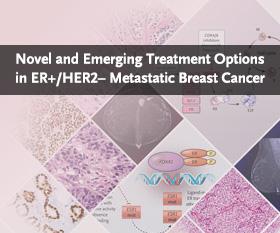
Novel and Emerging Treatment Options in ER+/HER2− Metastatic Breast Cancer
This video series offers a unique opportunity to hear directly from leading experts who not only treat patients but are also at the forefront of breast cancer research. These videos focus specifically on ER+/HER2− metastatic breast cancer, bringing together clinical insights and cutting-edge data. You will gain practical, up-to-date knowledge on evolving treatment strategies, how to navigate complex testing and sequencing decisions, and the real-world challenges of delivering personalized care.
Module 1: Therapeutic Advances in ER+/HER2− Metastatic Breast Cancer
Module 2: Antibody–Drug Conjugates for the Treatment of ER+/HER2− Metastatic Breast Cancer
Module 3: Emerging Therapies for ER+/HER2− Metastatic Breast Cancer
Target Audience
The intended audience includes physicians who specialize in oncology or hematology/oncology and other clinicians that routinely treat patients with ER+/HER2− metastatic breast cancer such as physician assistants (PAs) and Advanced Practice Registered Nurses (APRNs).
Learning Objectives
Module 1: Therapeutic Advances in ER+/HER2− Metastatic Breast Cancer
- Choose appropriate therapy for ER+/HER2− metastatic breast cancer, especially in the post-CDK4/6 inhibitor setting.
- Summarize the clinical trial data for novel medications available for the treatment of ER+/HER2− metastatic breast cancer.
- Describe the relevance, applicability, and interpretation of biomarker testing to guide individualized treatment decisions in patients with ER+/HER2− metastatic breast cancer.
Module 2: Antibody–Drug Conjugates for the Treatment of ER+/HER2− Metastatic Breast Cancer
- Describe the role of antibody–drug conjugates (ADCs) for the treatment of ER+/HER2− metastatic breast cancer.
- Incorporate biomarkers into treatment decisions for metastatic breast cancer, including HER2-low and HER2-ultralow breast cancer.
- Summarize the current data on sequencing of ADCs.
Module 3: Emerging Therapies for ER+/HER2− Metastatic Breast Cancer
- Summarize the current data on emerging therapies for ER+/HER2− metastatic breast cancer.
- Describe the mechanisms of action of emerging ER-targeting agents for ER+/HER2− metastatic breast cancer.
- Outline the potential advantages of tumor/mutant-selective PI3Kα inhibitors.
Disclosure of Support:
This activity is supported by an independent educational grant from Pfizer and Arvinas
Related Articles
NEJM
Imlunestrant with or without Abemaciclib in Advanced Breast Cancer. Komal L. Jhaveri and Others. N Engl J Med 2025;392:1189-1202.
Trastuzumab Deruxtecan after Endocrine Therapy in Metastatic Breast Cancer. Aditya Bardia and Others. N Engl J Med 2024;391:2110-2122.
Inavolisib-Based Therapy in PIK3CA-Mutated Advanced Breast Cancer. Nicholas C. Turner and Others. N Engl J Med 2024;391:1584-1596.
Ribociclib plus Endocrine Therapy in Early Breast Cancer. Dennis Slamon and Others. N Engl J Med 2024;390:1080-1091.
Capivasertib in Hormone Receptor–Positive Advanced Breast Cancer. Nicholas C. Turner and Others. N Engl J Med 2023;388:2058-2070.
Overall Survival with Ribociclib plus Letrozole in Advanced Breast Cancer. Gabriel N. Hortobagyi and Others. N Engl J Med 2022;386:942-950.
Trastuzumab Deruxtecan in Previously Treated HER2-Low Advanced Breast Cancer. Shanu Modi and Others. N Engl J Med 2022;387:9-20.
21-Gene Assay to Inform Chemotherapy Benefit in Node-Positive Breast Cancer. Kevin Kalinsky and Others. N Engl J Med 2021;385:2336-2347.
NEJM Evidence
CDK4/6 Inhibitor Efficacy in ESR1-Mutant Metastatic Breast Cancer. Maxwell R. Lloyd and Others. NEJM Evid 2024;3(5).
Can De-Escalation of Adjuvant Therapy Be Considered for Older Adults with Breast Cancer? Manjeet Chadha and Others. NEJM Evid 2025;4(4).
Clinical and Genomic Risk for Late Breast Cancer Recurrence and Survival. Joseph A. Sparano and Others. NEJM Evid 2024;3(8).
TAILORing Estimates of Late Breast Cancer Recurrence with the RSClin Tool. William R. Gwin and Others. NEJM Evid 2024;3(8).
Format & Estimated Time to Complete: This activity features 1.25 hours of videos, resources, exams, and an evaluation.
Exam/Assessment: A score of 100% is required to receive AMA PRA Category 1 Credits™.
Disclosure Statement:
All individuals in control of the content for a Massachusetts Medical Society accredited continuing education activity must disclose all financial relationships with ineligible companies within the past 24-months. The following individuals disclosed relevant relationships with ineligible companies.
Claudine Isaacs, MD, FRCPC, FASCO
AstraZeneca, Genentech, Consultant
Gilead, Novartis, Merck, Consultant
Ilana Schlam, MD, MPH
AstraZeneca, Consultant
Sarah Sammons, MD
Sermonix, Gilead, Seagen, Consultant
AstraZeneca, Daichi Sankyo, Consultant
Relay Therapeutics, Consultant
Komal Jhaveri, MD, FACP
Novartis, Pfizer, AstraZeneca, Consultant/Advisor, Research Funding
Genentech, Lilly, Gilead, Consultant/Advisor, Research Funding
Scorpion Therapeutics, Consultant/Advisor, Research Funding
Bristol-Meyers Squib, Consultant/Advisor
Abbvie, Blue Print Medicine, Consultant/Advisor
Seagen, Daichi Sankyo, Consultant/Advisor
Biotheranostics, Sanofi, Consultant/Advisor
Bicycle Therapeutics, Consultant/Advisor
Zymeworks, RayzeBio, Research Funding
Puma Biotechnology, Research Funding
VelosBio/Merck, Research Funding
Context Therapeutics, Research Funding
All relevant financial relationships have been mitigated prior to the beginning of this activity in accordance with ACCME and MMS policies. For this activity, all other individuals in control of content did not disclose any relevant financial relationships with ineligible companies.
Activity Term:
Original Release Date: May 30, 2025
Review Date(s): September 29, 2025; October 9, 2025
Termination Date: May 30, 2026
Activity Planner/Director, Moderator:

Ilana Schlam, MD, MPH
Clinician, Dana Farber Cancer Institute, Harvard Medical School
Dr. Schlam received her medical degree from Anahuac University in Mexico City in 2014. She subsequently completed her Internal Medicine residency at The Jewish Hospital of Cincinnati and then her Hematology and Medical Oncology fellowship at the MedStar Georgetown Washington Hospital Center in Washington, DC. She obtained her Master of Public Health degree from the Harvard School of Public Health in 2024. She was faculty at Tufts Medical Center from 2021 to 2024. In 2024, she joined the staff of the Dana-Farber Cancer Institute as a breast medical oncologist and clinical researcher. Her research focuses on drug development and identifying markers of response to novel therapies.
Speakers:

Claudine Isaacs, MD, FRCPC, FASCO
Professor of Medicine and Oncology
Associate Director, Clinical Research
Lombardi Comprehensive Cancer Center
Georgetown University
Dr. Isaacs is Professor of Medicine and Oncology, Associate Director for Clinical Research, and Leader of the Clinical Breast Cancer Program at the Lombardi Comprehensive Cancer Center (LCCC) at Georgetown University. She has extensive experience in the conduct of clinical trials focusing on early-stage and metastatic breast cancer and currently serves as Co-Chair of the Endocrine Resistance Working Group of the Translational Breast Cancer Research Consortium (TBCRC) and as Chair of the Clinical Trials Operations Working Group for the I-SPY 2 Trial. She has authored more than 300 peer-reviewed publications and has served on a number of national committees.

Sarah Sammons, MD
Associate Director, Metastatic Breast Cancer Program
Susan F. Smith Center for Women’s Cancers
Dana-Farber Cancer Institute
Assistant Professor of Medicine, Harvard Medical School
Dr. Sammons is an Associate Clinician at Dana-Farber Cancer Institute in Boston, MA, and faculty member of Harvard Medical School. Her clinical focus is on the treatment of all stages of breast cancer. She completed her fellowship in medical oncology and hematology at Duke University Hospital. In 2018, she joined the staff of Duke Cancer Institute and served as Associate Director of Breast Cancer Research. She joined Brigham and Women's Hospital and Dana-Farber Cancer Institute in 2022, where she serves as Associate Director of the Metastatic Breast Cancer Program. She is interested in developing novel systemic therapies to improve outcomes for patients facing breast cancer.

Komal Jhaveri, MD, FACP
Associate Attending, Breast Medicine Service and Early Drug Development Service
Section Head, Endocrine Therapy Research Program
Clinical Director, Early Drug Development Service
Patricia and James Cayne Chair for Junior Faculty
Department of Medicine, Memorial Sloan Kettering Cancer Center
Associate Professor of Medicine, Weill Cornell Medical College, New York, NY
Dr. Jhaveri is an Associate Attending Physician at Memorial Sloan Kettering Cancer Center (MSKCC), where she also serves as Section Head for the Endocrine Therapy Research Program within the Breast Medicine Service and as the Clinical Director for the Early Drug Development Service. She is an Associate Professor in the Department of Medicine (DOM) at Weill Cornell Medicine in New York. She earned her medical degree from the University of Mumbai, where she then completed training in nuclear medicine. She later completed her Internal Medicine residency from Icahn School of Medicine at Mount Sinai (Morningside/West) Program in New York and her Medical Oncology/ Hematology fellowship at MSKCC. From July 2012 to May 2015, she served as an Assistant Professor in the DOM at New York University and as an Attending Physician at the Langone Medical Center and at Bellevue Hospital.
Dr. Jhaveri’s research interests focus on the development of improved therapies for patients with breast cancer, by conducting novel clinical trials integrated with translational biomarker work through acquired biospecimen (cfDNA and tumor) or imaging analyses. She has led the development of PI3K/Akt inhibitors, FGFR inhibitors, ERBB2 inhibitors, oral SERDs, and antibody-drug conjugates, amongst others.
Planners/Reviewers:
Ole-Petter R. Hamnvik, MB BCh BAO, MMSc, MRCPI
Program Director, Endocrinology Fellowship, Brigham and Women’s Hospital
Associate Professor of Medicine, Harvard Medical School
Education Editor, NEJM Group
Christine H. Bruce, DMSc, MHSA, PA-C
Associate Professor and Program Director, Penn State University Physician Assistant Program
Kristin Wason, MSN, AGPCNP, CARN
Addiction Clinical Educator: Office Based Addiction Treatment, Boston Medical Center
Nurse Practitioner, Assistant Professor: Boston University Chobanian & Avedisian School of Medicine
Education Lead: Grayken Addiction Nurse Fellowship
Accreditation Statement:
The Massachusetts Medical Society is accredited by the Accreditation Council for Continuing Medical Education (ACCME) to provide continuing medical education for physicians.
AMA Credit Designation Statement:
The Massachusetts Medical Society designates this enduring material for a maximum of 1.25 AMA PRA Category 1 Credits™. Physicians should claim only the credit commensurate with the extent of their participation in the activity.
Joint Accreditation Statement: In support of improving patient care, this activity has been planned and implemented by Boston University Chobanian & Avedisian School of Medicine and the Massachusetts Medical Society. Boston University Chobanian & Avedisian School of Medicine is jointly accredited by the Accreditation Council for Continuing Medical Education (ACCME), the Accreditation Council for Pharmacy Education (ACPE), and the American Nurses Credentialing Center (ANCC), to provide continuing education for the healthcare team.
In support of improving patient care, this activity has been planned and implemented by Boston University Chobanian & Avedisian School of Medicine and the Massachusetts Medical Society. Boston University Chobanian & Avedisian School of Medicine is jointly accredited by the Accreditation Council for Continuing Medical Education (ACCME), the Accreditation Council for Pharmacy Education (ACPE), and the American Nurses Credentialing Center (ANCC), to provide continuing education for the healthcare team.
Physician Assistants: Boston University Chobanian & Avedisian School of Medicine has been authorized by the American Academy of PAs (AAPA) to award AAPA Category 1 CME credit for activities planned in accordance with AAPA CME Criteria. This activity is designated for 1.25 AAPA Category 1 CME credits. Approval is valid until May 30, 2026. PAs should only claim credit commensurate with the extent of their participation.
Boston University Chobanian & Avedisian School of Medicine has been authorized by the American Academy of PAs (AAPA) to award AAPA Category 1 CME credit for activities planned in accordance with AAPA CME Criteria. This activity is designated for 1.25 AAPA Category 1 CME credits. Approval is valid until May 30, 2026. PAs should only claim credit commensurate with the extent of their participation.
Nurses:
Contact Hour(s): 1.25, of which 1.25 are eligible for pharmacology credits
Available Credit
- 1.25 AANP Contact Hours
- 1.25 AANP Pharmacology Contact Hours
- 1.25 AAPA Category I CME
- 1.25 AMA PRA Category 1 Credit™
- 1.25 ANCC
- 1.25 Participation
To complete this CME activity, learners must:
(1) Review the learning objectives, disclosure statement, and accreditation statements;
(2) Navigate through all course pages and/or view video(s);
(3) Complete exams/assessments and evaluation;
(4) CLAIM credit;
(5) View/print certificate.
If you need to stop in the middle of a course, you may return to the course at any time to finish.
Required Hardware/software
This platform works with most modern web browsers (e.g., Chrome, Internet Explorer, MS Edge, Safari).
A PDF reader, such as Adobe Acrobat Reader, will be required to participate in some courses.

 Facebook
Facebook X
X LinkedIn
LinkedIn Forward
Forward